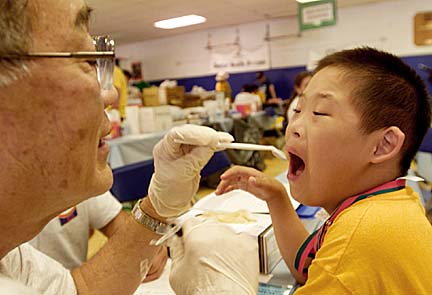


|
Special Olympics does "sports, not health." At least, that was the thinking of Chief Executive Officer Nancy Bottelo several years ago. Disabled athletes
get free checkupMore than 100 health professionals volunteer
to examine participants in the Special OlympicsBy Pat Gee
pgee@starbulletin.comResearch by Special Olympics International has changed her mind. "If an athlete's teeth are hurting, how well can he shoot a basketball? We have athletes in a race who can't see the finish line," she said.
The research showed that the mentally and physically disabled were among the most severely neglected in getting regular health care, Bottelo said. A major reason is the lack of doctors willing to see the disabled, she said.
That's why Special Olympics Hawaii set up a Healthy Athlete Village for the first time, offering free dental and vision screening over the weekend in its Summer Games at Kamehameha Schools.
"I'm thrilled. It's one of the best things we've ever done," she said.
About 250 of the 800 athletes took advantage of the health care services volunteered by more than 100 professionals. Next year, Special Olympics will also make hearing tests available, she said.
One of the athletes is Adam Yi, 8, of Salt Lake Elementary School, who sat on his glasses two months ago, said his mom, Nora Steffenson.
She brought him to the clinic because she thought the volunteer doctors and staff would have more experience working with disabled and could get a more accurate reading of his vision impairment.
But having Adam sit still and cooperate with the testing while he was hot and tired from competing in running and softball competitions was difficult, so Dr. Jane Kimura recommended he come back first thing the next morning, when he was fresh.
The doctors usually can fit a person for glasses and give them special tests that use shapes of objects rather than letters, she said. "It's pretty rewarding to fit someone for glasses who has never had an exam before. This is not just a clinic where we just refer them to someone and hope they get there."
Now, Adam will get a free pair of glasses in the mail.
Adam willingly opened his mouth for Dr. Samuel Ishimura, who heads the Queen's Medical Center Dental Clinic, which provided many of the volunteer doctors and staff.
"I see a little bit of spinach but no missing teeth," Ishimura said. "Ooh -- you got nice teeth, Adam. Good job!"
Kimura, a Kaiser Permanente Maui doctor in charge of the volunteer doctors and support staff for the vision screening, said most of the athletes were being tested for the first time in three years or never had an exam -- "they are so underserved."
Generally, in the disabled population, many of them do not see things in the distance well, and "we see lots of cataracts not detected previously," she said. Thirty percent of the more than 200 athletes seen needed glasses, Bottelo said.
Dr. Yong Han Koo, a resident at Queen's Dental Clinic, said he was having fun volunteering at Special Olympics "because I love sports. If I can contribute a little bit, I don't mind spending Saturday afternoon here. To me that's not much."
At Queen's he sees five or six disabled patients a month who need to undergo general anesthesia just to have cavities filled, a risky practice because they could have a heart attack or other complications. The parents or care givers do not realize the importance of regular oral hygiene, so he urges them to make sure their child/client brushes three times a day.
Dr. Patrick Chang, also of Queen's, said the child may have behavioral problems, "and they can't even get the kid to open his mouth or stay still. It's even too tough for the staff to get cooperation sometimes."
One of the goals of the Healthy Athletes Village was to give private physicians who volunteered a chance to work with the disabled and hopefully to become more comfortable with them, said Dr. Karen Hu, chief of the state Hospital and Community and Dental Services Branch, which provided many volunteers.
Hopefully, after their experience volunteering, they will realize "they had a good time, that they can take them into their office and treat them," said Hu. "It takes a bit more time to deal with behavioral problems. But it's a question of, Do you feel willing to be challenged a little bit?"
Her supervisor, Dr. Mark Greer, chief of the Dental Health Division, which deals with a majority of the state's disabled patients -- 2,400 per year -- said that if private practitioners worked with the Special Olympics athletes, they would see that disabled people "don't all have to be restrained or knocked out (with drugs)."
The state clinics and Queen's -- which have been faced with funding questions -- are the only ones who will take most of the disabled and the more severe cases, he said. "Without us, they (the disabled) won't have anything. We're speaking for people who can't speak for themselves," Greer said.